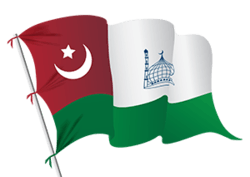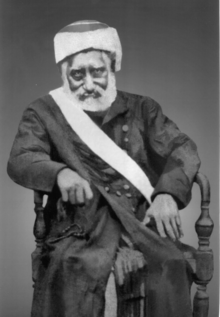Samastha Kerala Jamiat-ul-Ulema
Samastha Kerala Jamiat-ul-Ulema (the Samastha[5], pronounced Samasta Kerala Jam'iyyat al-'Ulama') is the principal Sunni-Shafi'i scholarly body in Kerala.[6][1][7] It was organised in the aftermath of the 1921 Mappila Uprising as a response to the growing Salafi movement in Kerala.[6][1] The body witnessed an organisational division[7] during the late 1980s, with a set of scholars forming a new group (the Kanthapuram or the A. P. Sunni[3][1]). The official group is now known as E. K. or the Samastha Sunni.[1][6][8][3]
Samasta Kerala Jam'iyyat al-'Ulama' | |
 Samastha Kerala Jamiat-ul-Ulema (E. K. or Official[1]) (flag) | |
| Nickname | Samastha[1] |
|---|---|
| Formation | June, 1926[1] |
| Founders | |
| Founded at | Kozhikode |
| Type | Scholarly body[1] |
| Legal status | Registered in India as per Societies Registration Act, 1860 |
| Headquarters | Chelari (south of Kozhikode)[4] |
Region | Kerala |
Founding President | Varakkal Mullakkoya Tangal[2] |
Founding Vice Presidents[2] |
|
Founding Secretaries[2] |
|
| Subsidiaries |
|
| Part of a series on |
| Islam |
|---|
 |
|
Samastha Kerala Jamiat-ul-Ulema is headquartered at Chelari, near the University of Calicut.[5] Sayed Jifri Muthukkoya Thangal is the current President of the Samastha.[9] Sayed Hyderali Shihab Thangal, the Kerala state President of Indian Union Muslim League, is the current Vice President[5] and K. Ali Kutty Musliyar is the current General Secretary of Samastha Kerala Jamiat-ul-Ulema.
A forty-member 'mushawara' is the high command body of both the Sunni groups.[4][10] The administration of Islamic education in Kerala is not managed by Government of Kerala.[7] The two Sunni bodies run thousands of mosques, madrasas (institutions where children receive basic Islamic education) and Arabic Colleges (the equivalent of north Indian madrasas). They run regular Malayalam and English medium arts-and-science and technology (professional) colleges also.[6]
Ordinary Sunnis of Kerala are largely identified with either the "E. K." or the "A. P." group.[11] The Samastha (E. K.) is often described as 'a grouping, and not a cadre-based organisation'.[10]
History
Early years
Samastha Kerala Jamiat-ul-Ulema, or the Samastha, was organised in 1926 as a response to the growing Salafi movement in Kerala.[6][1][12]
A nascent form of the Ulema was formed in Kozhikode in 1925.[2] This was organised by Maulana Pangil Ahmad Kutti Musliyar and Varakkal Ba Alavi Mullakkoya Tangal with K. P. Muhammad Miran Musliyar as the President and Parol Husain Maulavi as the Secretary.[2] The Ulema was formally constituited on 26 June, 1926 at Town Hall, Kozhikode.[2]
| Structure of the Ulema (1926) | |
|---|---|
| President[2] | Varakkal Mullakkoya Tangal |
| Vice Presidents[2] | Pangil Ahmad Kutti Musliyar |
| Abulhaq Muhammad Abdul Bari Musliyar | |
| K. M. Abdul Qadir Musliyar, Pallippuram | |
| K. P. Muhammad Miran Musliyar | |
| Secretaries[2] | P. V. (Palli Veettil) Muhammad Musliyar |
| P. K. Muhammad Musliyar | |
Timeline
- 1925 — a nascent form of the Ulema formed at Valiya Juma Masjid, Kozhikode.[2]
- 1926 June 26 — S. K. J. U. formed at Kozhikode Town Hall in the presence of Sayyid Shihabuddin Cherukunjikkoya Thangal[2]
- 1927 Feb 7 — First conference at Tanur in the presence of Liyauddeen Hazrath (Nalir Bakhiyath)
- 1929 Dec — S. K. J. U. published its first periodical al-Bayan.[12]
- 1932 June — Pangil Ahmad Kutti Musliyar appointed as the President of S. K. J. U. (succeeding Varakkal Mullakkoya Tangal)
- 1934 Nov 14 — S. K. J. U. officially registered by law at Kozhikode district registrar office.
- 1951 March 24 — Paravanna Mohiyadheen Kutty Musliyar appointed as S. K. J. U. General Secretary
- 1951 Sep 17 — Samastha Kerala Islam Matha Vidhyabhyasa Board (S. K. I. M. V. B) formed
- 1954 April 26 — S. K. J. U. formed a youth wing under its fold "Samastha Kerala Sunni Yuvajana Samgham (SYS)"
- 1965 — Jamia Nooriyya Arabiyya established at Pattikkad (near Perintalmanna).[8]
- 1978 — Kanthapuram A. P. Aboobacker Musliyar forms Jamia Markazu Saquafathi Sunniyya at Karanthur, near Kozhikode.[13]
- 1989 — Organisational division.[7]
Educational activities
Madrasa in Kerala refers to institution where children receive basic Arabic language and Islamic instruction.[6] As of 2008, the Samastha runs over 8,000 Kerala madrasas with around one million students (the Salafi movement-oriented groups run around 500 Kerala madrasas).[6] Around 72,000 teachers are registered with these madrasas.[6] The Samastha also runs a chain of Arabic Colleges in Kerala (equivalent of north Indian madrasas).[6]
Both the Sunni organisations are running regular Malayalam and English medium arts-and-science and technology ("professional") colleges also.[6] The A. P. group runs educational institutions outside the Kerala state too.[10]
Publications
The Samastha is known for publishing a short-lived Malayalam monthly magazine in the late 1920s.[12] The periodical — known as al-Bayan — was first printed in 1929 (Arabic-Malayalam script).[12] The magazine reinvented itself in Malayalam Script for a short period in the 1950s.[12]
A. P. and E. K. groups
The two 'traditional' Sunni groups are named after the initials of leading scholars of each group.[7] Both of them were the leading scholars of Samastha Kerala Jamiat-ul-Ulema, until they were divided in 1989 over some political (such as the support to the Indian Union Muslim League and approach towards the Salafi movement), organisational and legalistic issues.[7][10]
Led by A. P. Aboobacker Musliyar ten members separated themselves from the 40-member mushawara in 1989, forming a parallel organisation. The scholars claimed their organisation is the 'original' Samastha.[10]
- The E. K. group is named after E. K. Aboobacker Musliyar.[7]
- The A. P. group is named after A. P. Aboobacker Musliyar.[7]
The E. K. group, in general, is politically aligned with the Indian Union Muslim League (a major member of the United Democratic Front) while the A. P. group generally supports the Left Democratic Front.[14][15] The A. P. group has also tilted and shifted its political support several times in the past.[16]
Leadership

Presidents
- Varakkal Mullakkoya Thangal (1924—1933)
- Pangil Ahmad Kutti Musliyar (1933—1945)
- Valakkulam Abdul Bari Musliyar (1945—1965)
- K K Sadakkathullah Musliyar (1965—1967)
- Kanniyath Ahmed Musliyar (1967—1993)
- Sayyid AbduRahman Imbichi Koya Thangal Al-Azhari (1995-2004)
- Kalambadi Muhammad Musliyar (2004-2012)
- Anakkara Koyakutty Musliyar (2012-2016)
- Kumaramputhur AP Muhammed Musliyar (2016)
- Sayyid Muhammad Jifri Muthukkoya Thangal (2017-Present)
General Secretaries
- P. V. Muhammed Musliyar (1924—1951)
- Paravanna Mohiyadheen Kutty Musliyar (1951—1957)
- E. K. Aboobacker Musliyar[12] (1957—1996)
- Cherushweri Zainuddeen Musliyaar (1996-2016)
- K. Alikutty Musliyar (2016-
Current Sunni bodies
| Name of the Sunni group[7] | E. K. Samastha[1][3] (or)
Samastha [17] | ||
|---|---|---|---|
| Scholarly body
(the Jamiat-ul-Ulema) |
Samastha Kerala Jamiat-ul-Ulema[7]
(website) |
Sayed Jifri Muthukkoya Thangal[17] | |
| Office Bearers | President | Sayed Jifri Muthukkoya Thangal[18] | |
| General Secretary | K. Alikkutti Musliyar[9]
Manorama|language=en|publication-place=Kochi}}</ref> | ||
| Mahallu Federation | Samastha Kerala Sunni Mahallu Federation
(S. M. F.) (website) |
||
| Educational board | Samastha Kerala Islam Matha Vidhyabhyasa Board | Samastha Kerala Sunni Vidhyabhyasa Board[19]
(website) | |
| Madrasa teacher's Association | Samastha Kerala Jamiat-ul Muallimeen
(website) |
Sunni Jamiat-ul Muallimeen
(website) | |
| Youth wing | Sunni Yuvajana Sangham (S. Y. S.) | Sunni Yuvajana Sangham (S. Y. S.)[21][22] | |
| Student wing | Samastha Kerala Sunni Students' Federation | Sunni Students' Federation (S. S. F.)[22][24]
(website) | |
| Children's wing | Samastha Kerala Sunni Balavedhi
(S. B. V.) (website) |
Sunni Bala Sangham | |
| Mouthpiece (daily) | Suprabhatham[25]
(website) References
External links | ||